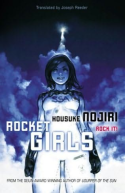 From the back cover:
From the back cover:
Yukari Morita is a high school girl on a quest to find her missing father. While searching for him in the Solomon Islands, she receives the offer of a lifetime—she’ll get the help she needs to find her father, and all she need do in return is become the world’s youngest, lightest astronaut. Yukari and her half-sister Matsuri, also petite, are the perfect crew for the Solomon Space Association’s launches, or will be once they complete their rigorous and sometimes dangerous training.
Review:
I was really looking forward to reading Rocket Girls. I’ve long been intrigued by VIZ Media’s venture into Japanese sci-fi, Haikasoru, but this is the first title in the lineup that I’ve read (unless you count Brave Story, which I read before it was grandfathered into the imprint). Alas, I ended up disappointed.
The basic plot is that Yukari Morita, a high school student weighing 37 kg. (81 lbs.) has traveled to the Solomon Islands during summer vacation to search for her deadbeat father. She ends up meeting scientists from the Solomon Space Association just when they’ve determined that they need a really light person to pilot their rocket, and when the director promises to help her find her father, she agrees. Later, her similarly petite half-sister Matsuri joins up to serve as backup. The SSA folks have a lot of trouble getting a rocket into orbit, but eventually succeed (sort of) and Yukari becomes a national hero.
I guess I was hoping for the novel equivalent of Twin Spica or something, but Rocket Girls doesn’t even come close to achieving the passion and poignancy on display in that series. In fact, it almost totally lacks any depth whatsoever. The book is about 80% dialogue, with very little insight into Yukari’s thoughts, let alone anyone else’s. As a result, many of the characters’ reactions and decisions are inexplicable. Here are some examples:
- The director of the space program, Isao Nasuda, calls up Yukari’s mother to obtain her permission for Yukari to become an astronaut. Without asking any questions at all, her mother agrees. I could accept a similarly carefree mom in a manga comedy, but it’s harder to swallow in a sci-fi novel.
- Very quickly, Yukari finds her father, who had no idea she even existed (having disappeared during his honeymoon). His reaction? “How about that?” What, that’s it?!
- Yukari decides she doesn’t fancy dying in an unsafe spacecraft, but her father won’t come back to Japan with her if she outright quits, so she decides to gain weight so that Matsuri will have to take her place. And then, suddenly, she’s done with that idea. I think this is because one of the scientists guys waxed poetic about his spacefaring dreams, but I’m not sure.
- Yukari then decides to become hyper-vigilant about the safety of the craft and goes on a hunger strike protesting some new fuel mixture. And then later, when she’s strapped in and ready to take off, the team finds a problem. Her response? “If we let every little thing scare us, we’ll never launch.” Uh, then what was that whole protest about? She even had a sign.
At first, I was bothered that none of the adults seemed to have any empathy for Yukari. They treated her as a tool and spoke dispassionately of bringing her to her breaking point so they could test the jungle-survival capabilities of the new skintight spacesuit they’d designed for her. But then I realized that I had lost all empathy for Yukari, too! Probably I was supposed to care when she nearly died during the flight, but I did not. I just wanted the book to end. After a kind of cool but very brief visit to Mir, I got my wish.
Is one slightly nifty bit near the end enough to recommend the book? I think not. There is also a sequel, but I’ve no intention of reading it.




Recent Comments